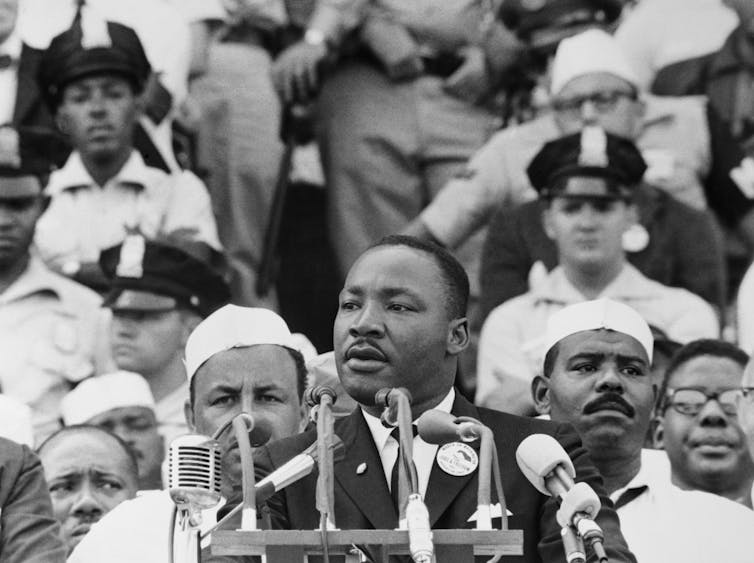Forget the warm fuzzies of finding common ground – to beat polarization, try changing your expectati
The key to civic coexistence might be learning to look out for neighbors even if we can’t stand them. No friendly feelings required.

More than 70% of voters in Colorado’s Douglas County, conservative and progressive alike, voted “no” on home rule in June 2025. The ballot measure would have granted the county increased control over certain local matters such as building zoning, parking rules and sewer maintenance.
Historically Republican, but home to a growing population of vocal Democrats, the county is a microcosm of American political divides – from book ban debates to COVID mask controversies. Does this divided county’s bipartisan rejection of home rule mean that Coloradans have cracked the polarization problem?
Alas, not really.
It turns out both sides recoiled at the expensive and rushed nature of the election. It was hardly the heartwarming tale of opponents warming up to each other, which is often the civic solution good humans on both sides seem to be wishing for.
You can sense that longing in a public radio headline announcing the “liberal urban gardener breaking bread with a conservative military-family matriarch.” Or in Sarah Silverman’s “I Love You, America,” a TV series in which the comedian set out to high-five her way across a divided country. You see it in The Village Square, a nonprofit civic organization that describes itself as a “nervy bunch of liberals and conservatives” who promise bipartisan dialogue with disagreement but also “a good time.”
But what if this particular kind of trying sets the bar too high – or, at least, too comfy and cozy?
As a philosopher who studies meaning-making, ethics and politics across traditions, I’d like to suggest that Coloradans don’t need to hug it out or high-five their way forward. Rather, they can look to a variety of ethical traditions for insights about protecting each other even when they hate each other’s views and values.
On becoming fussy princesses
For starters, in American democracy some tensions are a feature, not a bug. While most would insist racism and sexism need to go, some disconnects – such as religious differences – are going to stay. So dreaming of full-on harmony with neighbors kind of misses the point.
Furthermore, as I’ve argued elsewhere, the unity dream can put well-meaning neighbors at risk of becoming the civic equivalents of the princess and the pea. from the Hans Christian Andersen fairy tale. Just like a royal so pure that even piles of plush mattresses can’t prevent her being awakened by the lumpiness of a single pea, constantly seeking common ground can dispose people to become sameness-seekers who are increasingly allergic to difference.
And this can make everyone’s stomachs churn even more furiously at all of their not-just-like-them neighbors.
The legacy of Hard Hope
When it comes to better civics, embracing each other is not the only alternative to erasing each other. I’ve been developing a different remedy for rancor in American civic life.
It’s based on my decades of studying philosophy and gravitating always to each text’s most precarious and vulnerable insights on human authenticity and ethical response.
I call it “Hard Hope.”
Hard Hope takes its inspiration from the theological and ethical politics of a wide array of thinkers from many different backgrounds.

In a Christmas sermon in 1958, Martin Luther King Jr. reflected on the biblical injunction to “love thy enemy.” Referring to God, he notes: “It’s significant that he does not say, ‘Like your enemy.’ Like is a sentimental something, an affectionate something. There are a lot of people that I find it difficult to like.”
It’s an arresting insight that takes a moment to sink in: He’s saying that real neighborly love has little to do with heart emojis.
Similarly, Emmanuel Levinas, a Jewish philosopher, emphasizes being called upon to serve others not in light of shared ground but in light of their being “the absolutely other which I can not contain.” Levinas was inspired by Exodus 33:20 which says no human can see God’s face. He describes the utter otherness of the neighbor as an unknowable face to which people are nonetheless ethically beholden. People are beholden to others inasmuch as they are other, Levinas argues. Not inasmuch as people feel connected.
And in like spirit, the queer Chicana feminist Gloria Anzaldúa calls for a “spiritual activism” in which justice requires not only interrupting inequity, but also building with opponents. For such radical connection with others, Anzaldúa draws on the Nahuatl term for in between, “nepantla,” and issues a call to “nepantleras” – people who are able to navigate ambiguous thresholds within split perspectives.
“Honoring people’s otherness, las nepantleras advocate a ‘nos/otras’ position — an alliance between ‘us’ and ‘others.’ In nos/otras, the ‘us’ is divided in two, the slash in the middle representing the bridge – the best mutuality we can hope for at the moment,” she writes.
Hard Hope is a call to look out not only for neighbors we like but for neighbors we like least. That’s even as people take to voting booths to reject their opponents’ worst oversteps, and even as they work within and across communities to elevate justice and secure better futures for all. It’s not a call to change a group’s politics, though at times it can mean tempering them. And it always means distinguishing the call to engage politics from the call to engage people – even as it expects everyone to do both.
Hard Hope asks people to take a break from the bubblegum optimism of believing everyone is just moments away from seeing eye to eye and bursting into compassion, friendship and harmony across divides. Instead, Hard Hope invites people to take up the unusual mood of feeling a sense of debt to their neighbors without liking them. It’s a call to dig deep, beyond a sense of “shared humanity” to an even deeper sense of an “unshared otherness” that calls people into service to others.
It’s a radical form of hope that’s more about indebted coexistence than enthusiastic camaraderie.
And not a single loaf of bread needs baking or breaking in the process.
Sarah Pessin does not work for, consult, own shares in or receive funding from any company or organization that would benefit from this article, and has disclosed no relevant affiliations beyond their academic appointment.
Read These Next
Violent aftermath of Mexico’s ‘El Mencho’ killing follows pattern of other high-profile cartel hits
Members of the Jalisco New Generation Cartel have set up roadblocks and attacked property and security…
Colleges face a choice: Try to shape AI’s impact on learning, or be redefined by it
Colleges and universities are taking on different approaches to how their students are using AI –…
Meekness isn’t weakness – once considered positive, it’s one of the ‘undersung virtues’ that deserve
The word ‘meekness’ might seem old-fashioned – and not a positive trait. But understanding its…






